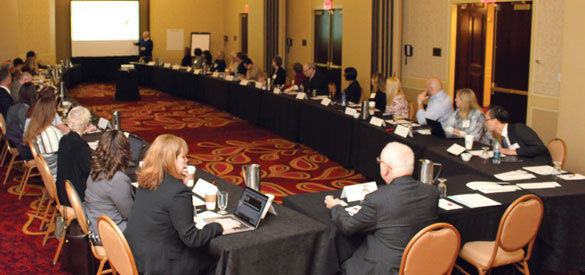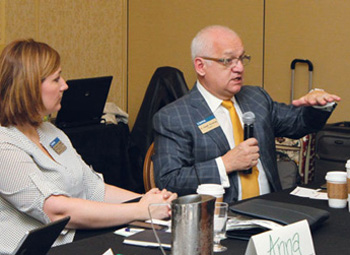Veterinary wellness roundtable advances conversation
Dr. Janet Donlin, CEO of AVMA PLIT, says she has received calls from policyholders who are stressed and potentially suicidal. But because they didn’t know what number to call to seek help, they called one they knew.
Dr. Jonathan H. Foreman, associate dean for academic and student affairs at the University of Illinois College of Veterinary Medicine, said he worries about the struggling students who received help during school but don’t have the same support once they graduate, as he can only advise them informally or refer them to the career center once they’re gone.
Dr. Christine Jenkins, senior director of veterinary medical services and outcomes research at Zoetis, said, “An additional challenge is the misconception among more established veterinarians that this issue is someone else’s problem. They often associate these challenges with young, female, small animal practitioners, but this impacts our broader veterinary population. In some cases, many do not seek help because it’s uncomfortable to talk about.”

Their discussion was part of a veterinary profession wellness roundtable, held March 14-15 in Schaumburg, Illinois, and convened by the AVMA. The 35 participants talked about major causes of wellness issues among veterinarians, strategies to promote wellness among veterinary professionals, barriers to implementing wellness programs, and solutions to overcome these barriers. The participants were representatives of the AVMA and other veterinary organizations, universities, large private employers of veterinarians, the AVMA Future Leaders Program, and private industry, along with experts in psychological wellness.
The main consensus from the roundtable was that the profession needs to improve awareness of mental illness, mental health treatment, and suicide prevention resources; decrease the stigma associated with mental illness within veterinary colleges, veterinary medical associations, and veterinary licensing boards; and enhance the educational experience, both in veterinary colleges and in continuing education, through training in coping skills. Participants highlighted the following specific priorities to explore:
- Seek continuing education credits for wellness.
- Explore creation of a national hotline for veterinarians.
- Consider an expanded wellness website with links to coalition organizations to make existing resources easier to find and access.
- Explore creation of more support communities for veterinarians.
- Identify mental health strategies and build resilience among students.
- Study successful wellness strategies specific to the lesbian, gay, bisexual, and transgender community
A steering group will take leadership and define strategy, create an action plan, and develop resourcing among a coalition of members that is still to be assembled, but most likely will be similar to the Partners for Healthy Pets alliance. Other roundtable attendees divided themselves among subcommittees to tackle specific priorities.
Dr. Joe Kinnarney, AVMA president, said, “My takeaway is we have to keep this moving forward; we can’t just slow down. It’s a marathon, but we want to get out of the gate fast. This is so important for our profession, not just veterinarians, but technicians and receptionists, too. It’s all a family and about bringing that family back to what we do best: caring for animals.”

Dr. Ron DeHaven, AVMA CEO and member of the steering group, said veterinary wellness is a priority for the AVMA, which certainly will do its part to address the issue, but, he added, “It’s more powerful when it’s more than the AVMA, and we all speak with one voice and all direct individuals to all resources there are for their particular need, whether they reside at the AVMA website or with a separate coalition organization.”
Roundtable participants plan to host a wellness session at this year’s AVMA Annual Convention, being held Aug. 5-9 in San Antonio, that will give an overview of recommendations from the roundtable and provide an opportunit for open discussion by the veterinary community.
In addition, the 2015-2016 Future Leaders class will offer wellness programming at the convention. The class is also developing a guide to wellness in the workplace with a targeted audience of organization leaders and practice owners or managers. The guide will touch on modeling healthy behavior to shape a healthy culture in the workplace, overcoming obstacles, facilitating regular wellness check-ins to communicate new wellness measures, and forming a powerful coalition by identifying a wellness champion.
“It shows people how to shape wellness in the workplace, build on that change, create momentum, and make it stick,” said Dr. Aimee Eggleston Ahearn, a member of this year’s class. The Future Leaders, whose program is funded by Zoetis, currently have more than a dozen pilot sites where they are testing their toolkit to see how it fares in the real world and ensure it’s applicable to various sectors of the profession.
The 2014-2015 AVMA Future Leaders focused on wellness issues as well. They developed a professional quality-of-life assessment and survey along with a wellness resources toolkit, available at www.avma.org/wellness. Plus, they wrote an article for JAVMA, “Taking stock and making strides toward wellness in the veterinary workplace” (J Am Vet Med Assoc 2015;247:739-742), in addition to hosting a half-day symposium at the 2015 AVMA Annual Convention in Boston.
From Nov. 4-6, Colorado State University will host the fourth annual Association of American Veterinary Medical Colleges Health and Wellness Summit. There will be student, administrator, and practitioner tracks. The goals of the summit are to share specific interventions for enhancing and protecting health and wellness within the veterinary profession, define best practices used to address these issues and form collaborations to advance best practices, and formulate strategies likely to result in specific programs and initiatives that will support veterinary students, administrators, and practitioners in achieving personal and professional well-being.
Videos
The Student AVMA Wellness Task Force has released a series of videos on YouTube to combat the stigma surrounding mental health in the veterinary profession. These “It’s OK” videos feature veterinary students, faculty members, clinicians, veterinary technicians, and school counselors discussing their struggles with mental health and wellness. The full playlist is available here.
Related JAVMA content:
Board acts on wellness and food security measures, elects officers (Sept. 1, 2015)
Future Leaders focus on career transitions, wellness (Oct. 1, 2014)
AVMA Board manages agenda of diverse topics (June 1, 2015)